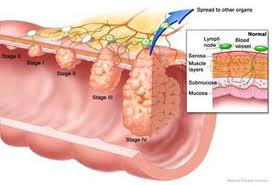When colon cancer comes back (Duke stage D cancer) there often are seedlings of cancer cells in the peritoneal cavity, which in the past made surgery impossible. However, at Montreal’s Maisonneuve-Rosemont Hospital the surgical oncologist, Dr. Pierre Dubé, is using a brand new technique that allows to do surgery even in these difficult cases. It has been known for some time that cancer cells are heat sensitive.
At the time of the surgery all of the visible cancer is removed, like with ovarian cancer, using a cytoreductive surgery approach. At the end all invisible cancer cells are treated with a combination chemotherapy fluid that is introduced into the abdominal cavity and that is heated in a controlled manner. Heat probes measure the temperature and make sure the fluid is heated to 44°C (111°F). Other experiments have shown that at this temperature chemotherapeutic agents enter into the cancer cells faster, as they had been rendered more fragile by the heat. The end result is an increase in survival by 2 to 2 1/2 years. This is a breakthrough because in the past conventional combination chemotherapy for this group of advanced colorectal cancer patients achieved a remission (meaning “response rate”) of 0%. Now with this new technique there is a remission rate of 30% to 50%. Hyperthermic chemotherapy for colon cancer was pioneered at the Gustave Roussy Institute in Paris where Dr.Dubé was introduced to this technique. This was reported in the Jan. 14, 2003 edition of The Medical Post (page 7). According to Dr.Dubé about 10% of all colorectal cancer patients will need this type of surgical approach and about up to 25% of patients who develop cancer spread into the abdominal cavity (peritoneal carcinomatosis) would be potential candidates for this treatment modality.
Comments: Recently there has been a paper intitled “Factors predicting survival after intraperitoneal hyperthermic chemotherapy with mitomycin C after cytoreductive surgery for patients with peritoneal carcinomatosis” by P.Shen et al. (Arch Surg – 01-JAN-2003; 138(1): 26-33). 109 patients with carcinomatosis of the abdominal cavity with different cancers were treated with cytoreductive surgery and hyperthermic chemotherapeutic solutions. With this procedure, after complete removal of gross cancerous disease, the 3-year survival rate achieved 68% versus 21% of those where gross cancer removal was not entirely possible.
Last edited October 25, 2014






